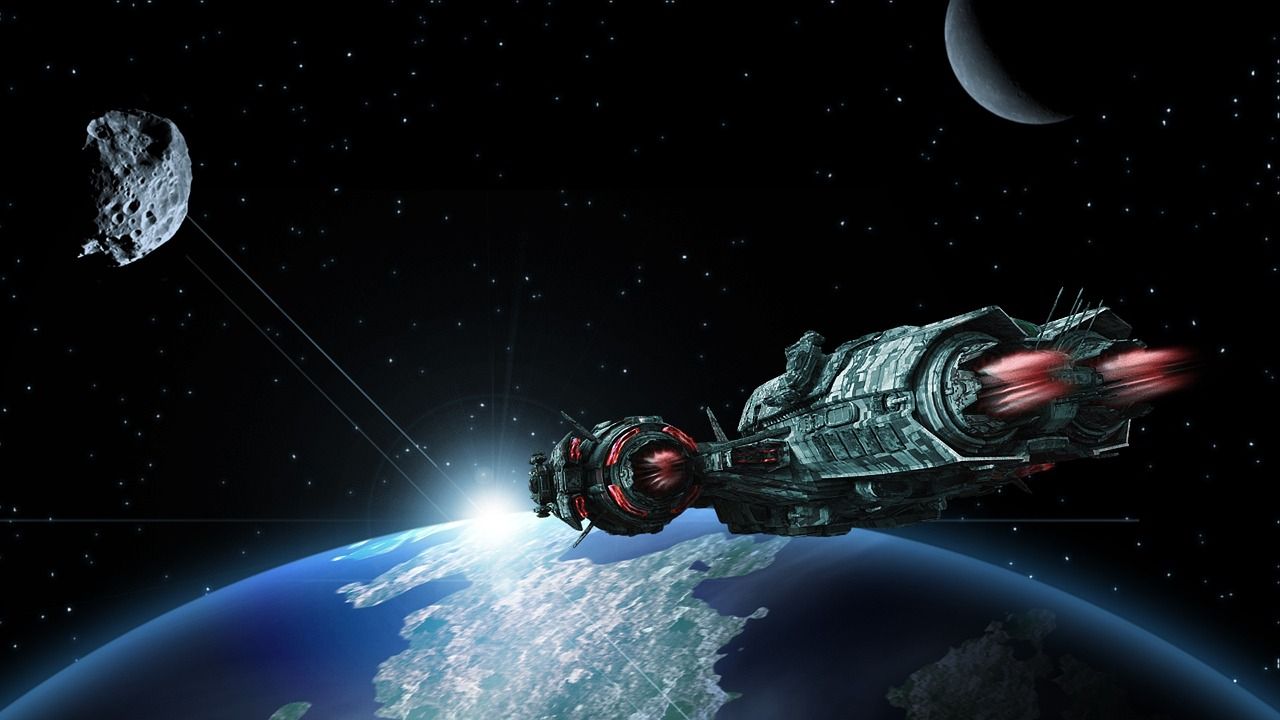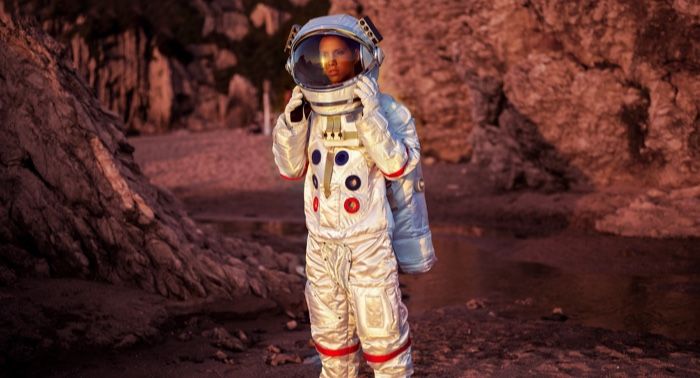My husband and I are currently watching Star Trek: Deep Space Nine, me for the first time, him for about the billionth. After watching one episode where religious fundamentalists insist that the space station’s school teach their holy stories instead of scientific fact, and bomb the school when the teacher doesn’t agree, my husband leaned over to me and commented “But you know, Star Trek was never political.”
“[Sci fi story] was never political” is a running joke of ours, usually said with an eye roll and a bitter laugh at the complaint du jour about sci-fi stories that dare to centre anyone who isn’t a white, cishet man. Sci-fi has been decried as “political” for telling stories about people of colour or women (and predictably, some of the worst backlashes have come when a central character happens to be a woman of colour). Stories have been panned or banned for including LGBTQ+ people and relationships.
Writers who share the marginalisations of their characters are at the greatest risk of being harassed and attacked for daring to publish in a space that reactionary gatekeepers see as “theirs”. The ‘Sad Puppies’ campaign was a coordinated attempt by right-wing, “anti-diversity” pundits to influence the results of the Hugo Awards and push works by authors of colour, women, and LGBTQ+ people to the sidelines. Fortunately, it was unsuccessful — and not only because it was a clumsy, transparent attempt at attacking diversity. The fact is that sci-fi has never been a white, cishet, male, or conservative domain. It has always been a space for subversion, radical thinking, and rebelliousness — and marginalised people have been there from the beginning.

Sci-fi’s rebellious origins
Many stories are contenders for the title of “first sci-fi story”, but two of the strongest possibilities are The Blazing World (1666) by Margaret Cavendish, or Frankenstein (1818) by Mary Shelley. The Blazing World is a story following a woman who finds her way into a utopian world through a portal at the North Pole. Despite being more of a fantasy tale, The Blazing World features (for the time) impossible gadgets and technology such as submarines, as well as the wormhole-like passageway to the Blazing World itself, making it a definite contender for one of the earliest works of sci-fi. Frankenstein is far closer to the sci-fi of today, featuring a reckless scientist creating a monster using a new and secretive technological process (although the image of electrifying the Creature into life comes from the films —Shelley’s novel never discloses the details of how Victor Frankenstein animates his Adam).
While Cavendish and Shelley were both upper-class women with financial resources, they were still women writing at times when only men’s writing was considered to be worthy (the Bronte sisters, writing 30 years later than Shelley, still had to publish under male pseudonyms to be taken seriously, while Jane Austen, whose life overlapped with Shelley’s, published anonymously). Literature as a field was not open to women, and yet women writers had a huge influence in kickstarting the sci-fi genre. Not only that, but continuing it with the works of writers like Ursula K. Le Guin, Octavia E. Butler, and many others writing in the mid-20th century, when sci-fi had truly come into its own as a genre.
Like the view of sci-fi as a “male” genre, the assumption that sci-fi has traditionally been a “white” genre also goes against the reality of sci-fi history. Many authors of colour have been part of sci-fi for decades. Octavia E. Butler, Nalo Hopkinson, and Samuel R. Delany wrote many significant sci-fi works in the 20th century, and N. K. Jemisin, Nnedi Okorafor, and Ryka Aoki, amongst many others, have continued the tradition in the 21st. Publications such as Fiyah Magazine have championed Black speculative fiction, while Uncanny Magazine publishes diverse sci-fi and fantasy by marginalised authors. From sci-fi’s beginnings to the present day, marginalised authors have always been present.
Missing the point by 12 parsecs
As we can see from the early and consistent contributions of marginalised writers, and the question-everything content of the works themselves, sci-fi has always been a genre steeped in rebellion, progressive thinking, and resistance to outdated and harmful traditions. Unfortunately, many people have dismissed this aspect of sci-fi, and insisted that it used to be an apolitical space where men were men and women were green-skinned spacebabes (conveniently forgetting that a patriarchal fantasy is still political — it’s just the politics of conservatism).
In a snide article in 2018, UK tabloid The Sun published a scathing piece about ‘snowflake students insisting that Frankenstein’s monster is a misunderstood victim’, apparently oblivious to the fact that the Creature’s victimhood is the crux of the entire text. Frankenstein’s monster only becomes monstrous because he is repeatedly rejected by his father figure and the rest of society, and is denied the chance to have a companion like himself.
But if you consider the content of sci-fi, it’s always leant far more towards the radical and progressive than the traditionalist and conservative. This is unsurprising, for a genre where marginalised writers have been consistently working since the beginning — after all, who can see the flaws in our current world and imagine a utopia better than someone who has firsthand experience of society’s prejudices and aggressions? Even stories by white male sci-fi writers tackle social inequities more often than not — Asimov’s musings on the rights of robots reflect the history of civil rights movements, and Ira Levin’s The Stepford Wives expertly skewers how patriarchal society commodifies and destroys women.
Writers who experience marginalisations often weave these into their stories — Butler’s Fledgling is an examination of racism by way of vampire scientists, Seanan McGuire centres disability and chronic health conditions in both her zombie and mermaid stories, and April Daniels creates a near-future in her Dreadnought series that puts a trans superhero front and centre.
Whether a story deals with the fight against an evil empire, the development of new technology that makes the far reaches of space accessible, or the question of who counts as human, sci-fi has always rebelled against the status quo and held a mirror up to current society, encouraging us not only to see the problems of the present day, but to imagine how we can build something amazing.
If you want to add more to your TBR list, try 11 Black Sci-Fi Authors to Read Right Now. For an interesting spin on sci-fi, try 10 of the Best Historical Science Fiction Books.

